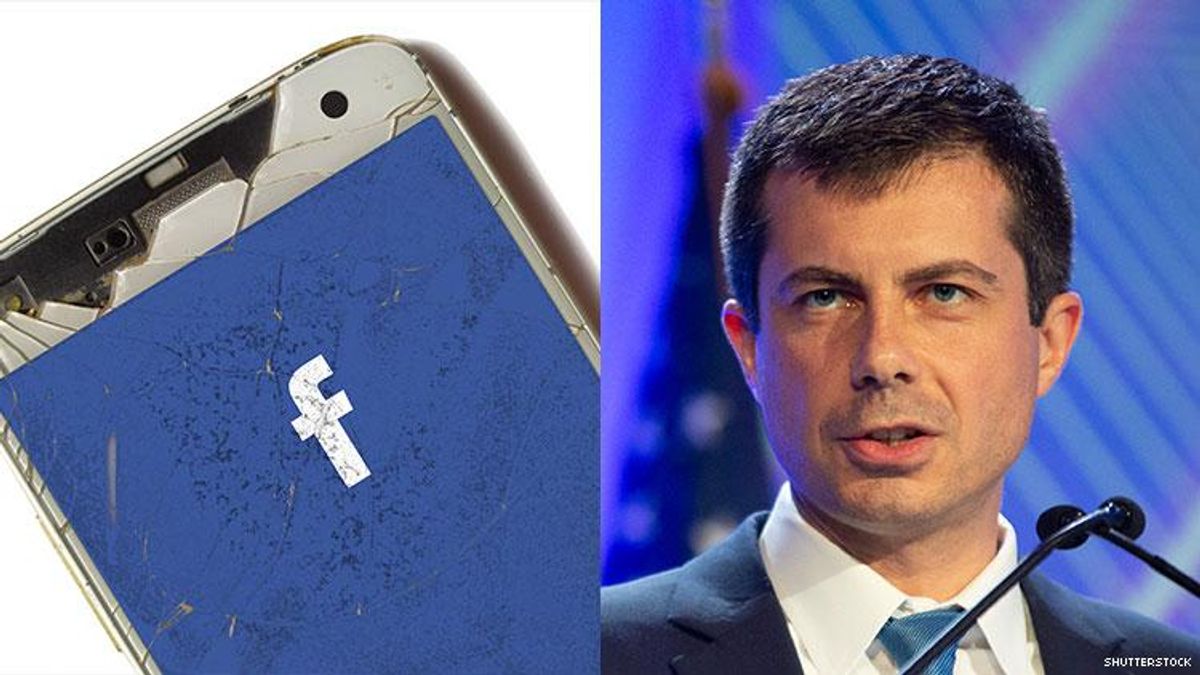Mark Zuckerberg, Facebook's founder and CEO, was questioned on his connections to the campaign of Pete Buttigieg, the gay South Bend, Ind., mayor seeking the Democratic nomination for president.
As Bloomberg reported Monday, the tech billionaire recommended several hires for the insurgent candidate's campaign. Buttigieg spokesperson Chris Meagher confirmed to the outlet that both Zuckerberg and his wife, Priscilla Chan, had offered staff recommendations. Chan is a pediatrician and cofounder of the Chan Zuckerberg Initiative.
"This shouldn't be taken as an endorsement," Zuckerberg said in a Monday media conference call when asked about the Bloomberg report.
Zuckerberg said that he and Buttigieg's campaign were connected by mutual friends who saw a Facebook Live event the mayor previously did. Buttigieg and Zuckerberg both attended Harvard University and the politician was one of the first 300 users to use the social network (287th to be exact).
"[The hiring suggestions] should not be misconstrued as if I've been deeply involved in trying to support [Buttigieg's] campaign," Zuckerberg said.
Buttigieg has been critical of Facebook in the past, but not as much as Democratic frontrunner Sen. Elizabeth Warren, who proposes breaking up Facebook, believing it has too much control over messaging and disinformation.
The reason for the Facebook press call was an update on their plans to stop disinformation campaigns leading up to the 2020 U.S. presidential election. As confirmed by the FBI, the Russians -- overseen by President Vladimir Putin -- organized a sweeping campaign in 2016 that pushed erroneous stories and memes on the social media platform regarding then-Democratic nominee Hillary Clinton, and other stories that attempted to benefit their chosen candidate, Donald Trump.
Zuckerberg and his top executives explained their plans to stop similar campaigns in 2020, but have stopped short of banning advertising campaigns from American politicians containing information proven to be false.
Instead of removing disinformation from politicians, Facebook will use artificial intelligence to identify untrue stories and utilize "more prominent labels" that mark them as false. Third-party fact-checkers will determine which stories are lies and which are true. The social media giant will also include labels that notify users which political stories are coming from a country other than the United States and ban ads paid for by state-controlled or government-controlled media. Zuckerberg pointed out much of the disinformation the organization catches originates from Russia, Iran, and China.
Facebook does plan to ban paid advertising that encourages voter suppression to benefit one candidate over another -- possibly by stating voting is meaningless or lying about how and when to vote. Discouraging voters through disinformation and discouragement was a tactic employed by the Russians in 2016.
Zuckerberg was challenged several times on his decision to allow false stories to proliferate on his network, but defended his decision by saying it was "in line with other media companies," and that, "In a democracy, people should be able to see what candidates are saying."














































































